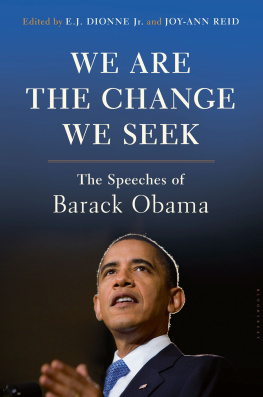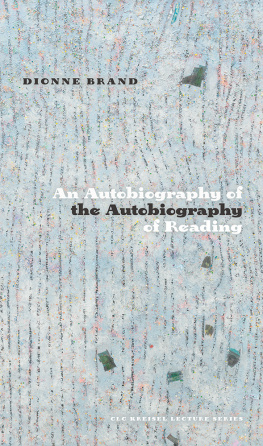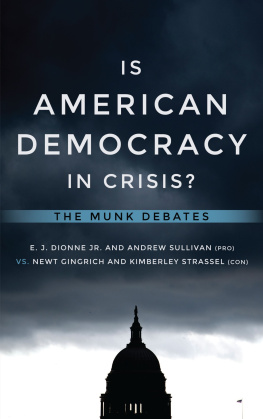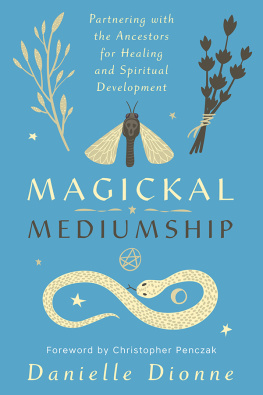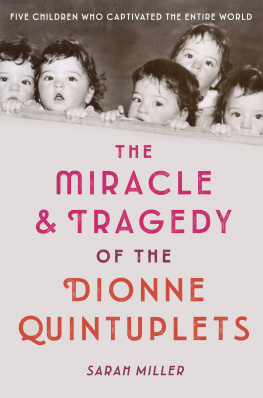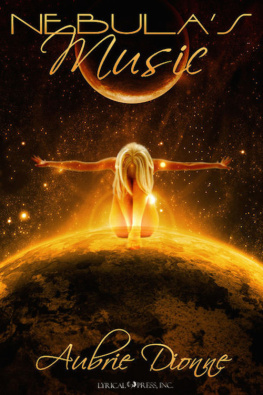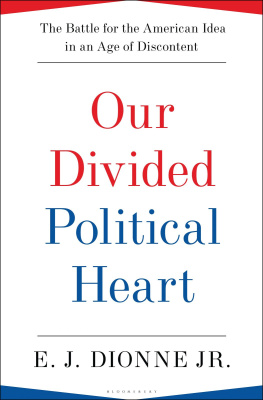E.J. Dionne Jr. - We Are the Change We Seek
Here you can read online E.J. Dionne Jr. - We Are the Change We Seek full text of the book (entire story) in english for free. Download pdf and epub, get meaning, cover and reviews about this ebook. year: 2016, publisher: Bloomsbury Publishing, genre: Politics. Description of the work, (preface) as well as reviews are available. Best literature library LitArk.com created for fans of good reading and offers a wide selection of genres:
Romance novel
Science fiction
Adventure
Detective
Science
History
Home and family
Prose
Art
Politics
Computer
Non-fiction
Religion
Business
Children
Humor
Choose a favorite category and find really read worthwhile books. Enjoy immersion in the world of imagination, feel the emotions of the characters or learn something new for yourself, make an fascinating discovery.
- Book:We Are the Change We Seek
- Author:
- Publisher:Bloomsbury Publishing
- Genre:
- Year:2016
- Rating:3 / 5
- Favourites:Add to favourites
- Your mark:
- 60
- 1
- 2
- 3
- 4
- 5
We Are the Change We Seek: summary, description and annotation
We offer to read an annotation, description, summary or preface (depends on what the author of the book "We Are the Change We Seek" wrote himself). If you haven't found the necessary information about the book — write in the comments, we will try to find it.
We Are the Change We Seek — read online for free the complete book (whole text) full work
Below is the text of the book, divided by pages. System saving the place of the last page read, allows you to conveniently read the book "We Are the Change We Seek" online for free, without having to search again every time where you left off. Put a bookmark, and you can go to the page where you finished reading at any time.
Font size:
Interval:
Bookmark:
To my wife, Mary Boyle, and our children, James, Julia, and Margot, who will always remember braving the cold to witness history on January 20, 2009.
To my husband, Jason Reid, and my children, Winsome, Jmar, and Miles, who were lucky enough to know for certain that someone who looks like them can be president.
And to John Lewis, who made it possible.
BY THE SAME AUTHORS
By E. J. Dionne Jr.
Stand Up Fight Back
They Only Look Dead
Why Americans Hate Politics
Souled Out
Our Divided Political Heart
Why the Right Went Wrong
By Joy-Ann Reid
Fracture: Barack Obama, the Clintons, and the Racial Divide

Barack Obama and the Audacity of Persuasion
E. J. Dionne Jr. and Joy-Ann Reid
Barack Obama entered the White House in January 2009 confronting as dismal a constellation of circumstances as any president since Franklin Roosevelt: a global financial meltdown that would come very close to being an economic collapse, skyrocketing rates of unemployment, and unpopular wars in Iraq and Afghanistan that showed no signs of being resolved. Despite his fervent campaign promise to ease the countrys political divisions, he discovered that he faced a Republican opposition intent on taking back power by stymieing his program, challenging his mandate to govern, and leaving his dreams of harmony stillborn.
Over time, this meant that Obama had to use his rhetorical gifts to confront and defeat his political adversaries. When circumstances required, Obama could be a highly effective partisan, which further embittered his opponents. Even at his most eloquent, Obama would never win over those who saw him as a dangerous philosophical antagonist.
Yet Obama never dropped the idea that beneath the surface of seething conflict, a country that had elected him as its first African American president was not as torn as it seemed to be. For his supportersand, increasingly, as his term concluded, for Americans who had grown weary of the endless partisan warsObama remained a figure intent on evoking Abraham Lincolns appeal to the better angels of our nature. By the time his presidency neared an end, even some among his opponents conceded, sometimes grudgingly, that Obama had a calm fluency they would miss.
Obama always understood that when it came to moving people through the spoken word, he had it. He acknowledged as much in 2009 to Harry Reid, then the Senate Majority Leader, after Reid described an Obama floor speech as phenomenal. In his memoir, Reid said he would never forget his response.
I have a gift, Harry, Obama said in a way that seemed quite matter of fact.
Reid insisted that Obama spoke these words without the barest hint of braggadocio or conceit, and with what I would describe as deep humility.
The account was published after Obama had become president and Reid, the loyal Democrat, may have been going out of his way to make sure the new president was not seen as arrogant in his certainty about his eloquence. Yet there was a plausibility to Reids claim because Obamas cool detachment often allowed him to tote up his own list of virtues and shortcomings dispassionately. He had simply concluded that being able to persuade, move, and inspire counted as one of his most important assets. He was right about this.
It is surprising that rhetorical genius is not and has never been essential to a successful presidency. Over the last century, the list of presidents we mark out as especially gifted speakers is not longFranklin Roosevelt, John F. Kennedy, Ronald Reagan, Bill Clinton, and Obama.
Roosevelt and Kennedy belong on the list not only because they spoke powerfully, but also because each mastered a new medium that had come to dominate politicsradio in FDRs case, television in JFKs. The demands of the two were different. Radio was warmly intimate, television friendly toward the coolly ironic. Reagan, liberals would always say, profited from his acting skills and from years on the speaking circuit, but he also excelled because he knew his own mind and had a clear sense of where he wanted to move the country. Clinton shared with Reagan a gift for making coherent arguments and the sure knowledge that making those arguments again and again was a central task of a successful presidency. At the 2012 Democratic National Convention, Clinton used his abilities to press the case on behalf of Obama, once his wifes bitter rival, winning from the man he now supported a new title, Explainer in Chief. Proving that even Obama could sometimes be outshone rhetorically, Clintons case for Obamas reelection was widely seen as more persuasive than the one the president made for himself.
In his choice of oratorical ancestors, Obamas first love was Lincoln, a sensible choice for a politician from Illinois who had declared his presidential candidacy in Lincolns adopted hometown of Springfield, and whose election as the first African American president fulfilled the work of the Great Emancipator. (It did so in a way that might have shocked Lincoln, who, especially early in his career, shared many of the racial prejudices of his time.) Obama had something else in common with Lincoln: a view that the trajectory of American history pointed toward justice and inclusion. Here, Obama also followed Martin Luther King Jr. Lincoln, King, and Obama all believed that the best way to redeem the American promise was to insist that from the countrys origins, this promise was inherent in its founding documents, the Declaration of Independence especially. Obama bound himself to the American past in order to change the future.
There was also a great deal of Roosevelt in Obama, both Franklin and Theodore. Obama, like Clinton, saw himself as the president of a new progressive era that shared in common with the original Progressive Era an imperative to deal with radical economic and social changes. If the early progressives sought to write new rules for a country that had moved from farm to factory and from rural areas to big cities, latter-day progressives would bring order and a greater degree of fairness to a nation even more metropolitan, both suburban and urban, and that was replacing manufacturing work with toil in the technological, scientific, and service economies. In one of the most important speeches of Obamas presidency, in Osawatomie, Kansas, Obama hitched himself firmly to Teddy Roosevelts intellectual and political legacies.
A president who took over in the midst of the greatest economic catastrophe since the Great Depression could not avoid embracing FDR, and he also had FDR thrust upon him. A cover of Time magazine depicted Obama as an FDR look-alike, with a confident smile and a jaunty cigarette holder at his lips. It seemed appropriate for a man who struggled with his smoking habit.
There were certainly some echoes of JFK, particularly in Obamas generational rhetoric. If JFK was the young voice of the World War II generation, Obama was the first president not touched by the turmoil of the 1960s and he saw himself as liberating the country from many of that eras assumptions, struggles, and discords. Despite what his conservative enemies often said about him, Obama, like Kennedy, was mistrustful of ideology and could sometimes be very tough on allies to his left. (His Osawatomie speech was, in part, an effort to rekindle their faith in him.)
Perhaps the most unexpected reference point for Obama, given the philosophical divide between them, was Reagan. But Obamas respect for the Gipper shouldnt surprise. They shared something unusual in our history: Both had used a single speech to push themselves into the highest reaches of American politics. It is hard to find other politicians who have done the same. William Jennings Bryan with his Cross of Gold speech in 1896 came closest.
Font size:
Interval:
Bookmark:
Similar books «We Are the Change We Seek»
Look at similar books to We Are the Change We Seek. We have selected literature similar in name and meaning in the hope of providing readers with more options to find new, interesting, not yet read works.
Discussion, reviews of the book We Are the Change We Seek and just readers' own opinions. Leave your comments, write what you think about the work, its meaning or the main characters. Specify what exactly you liked and what you didn't like, and why you think so.

